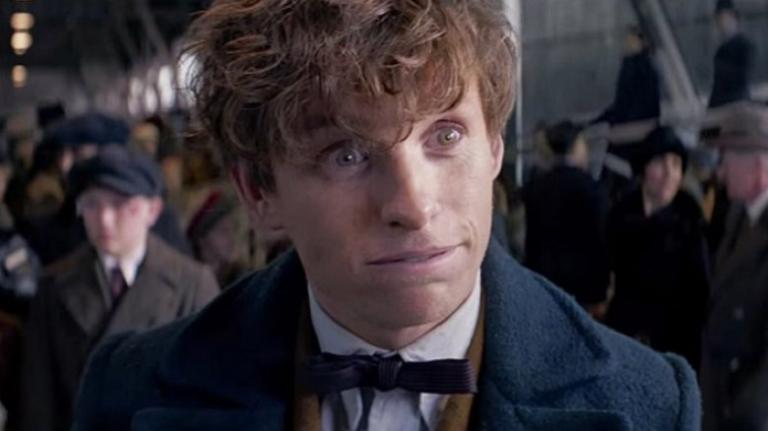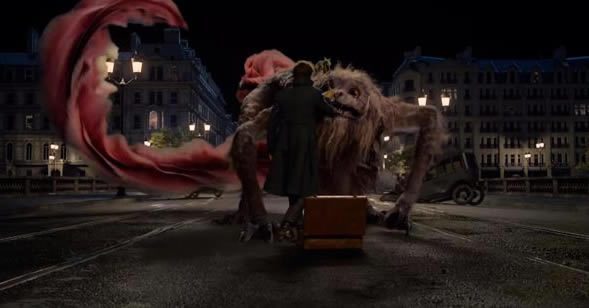
Fantastic Beasts: The Crimes of Grindelwald opens, appropriately enough, with a gathering storm.
Silver-tongued villain Gellert Grindelwald, tossed in prison in the last Fantastic Beasts film, makes a spectacular break for freedom in the movie’s first moments, conjuring a storm to aid his escape. Setting up a home base in early 20th-century Paris and driven by the idea of a magic-dominated world in which non-magical muggles are (in Grindelwald’s own words) simply “beasts of burden,” the wizard rallies his supporters and draws in new recruits through his spectacular speeches. He claims he fights “for freedom, for truth, for love.” He insists he wants to protect the world from a catastrophic war.
Still, it’s pretty obvious that Grindelwald (pronounced Grindelvald, according to Harry Potter and Fantastic Beasts author J.K. Rowling) is a stand-in for another European demagogue. Grindelwald escapes and literally reclaims his tongue in 1927, the same year that Bavaria lifted a ban on Adolf Hitler’s public speaking.
Much of the wizarding world already knows that Grindelwald is bad news, of course. Albus Dumbledore, head of the Hogwarts School of Witchcraft and Wizardry and Grindelwald’s old childhood companion, is perhaps the only magician who can step in a wizarding ring with Grindelwald. But thanks to a blood pact the two made, Dumbledore can’t move against him. Britain’s Ministry of Magic is very concerned with Grindelwald’s escape, too, but they’re hamstrung by bureaucracy and some rather short-sighted management.
And then there’s Newt Scamander, an unassuming magizoologist recruited by both Dumbledore and the Ministry to run to Paris and try to make the world a little safer.
They couldn’t have made a better pick.
Newt Scamander’s gentle and awkward and a little geeky, perhaps. He doesn’t look much like a hero. But he’s the ideal person to resist someone like Grindelwald—the yang to Grindelwald’s evil yin. In fact, if Grindelwald is an echo of Hitler, it seems to me that Newt’s got a little saint in him: Saint Francis most of all, perhaps.
First, the obvious: Both have a thing for animals.
Francis of Assisi is Catholicism’s patron saint of animals, and many of the paintings and sculptures of him have the guy surrounded by birds and animals, sort of like a particularly pious version of Snow White. He believed that the beauty of nature was a reflection of God’s goodness and that it should be appreciated and protected.
A famous legend has it that the townspeople of Gubbio were afraid of a particularly terrible wolf in the hills, one who killed animals and people alike. Francis, as any good fairytale woodcutter might, hiked into the hills to track down the wolf. But when he found him, Francis didn’t take a swing at the beast with an axe: He simply made the sign of the cross and told the wolf to come to him. The wolf obeyed, and Francis led it back into town like an oversize golden retriever, where it became an honorary Gubbio freeloader (since Francis told the villagers to feed the wolf regularly).
The story reminded me of a scene from Grindelwald, wherein Newt comes face-to-face with a huge, terrifying Zouwu. I won’t spoil the delightful scene, but rest assured, the two become quite close.

But their compassion doesn’t stop with animals.
Francis loved people, too, and radically so. Francis would preach to regular ol’ townsfolk—a big no-no at the time—and tried to follow Jesus’ example as closely as possible. He said that he “considered himself no friend of Christ if he did not cherish those for whom Christ died.”
We hear echoes of that element in Newt, too. When one of his dear friends makes a shocking confession, Newt shows love and forgiveness, insisting that a single mistake shouldn’t necessarily define anyone.
“You never met a monster you couldn’t love,” his friend wistfully tells him.
And both Francis and Newt shared a staggering level of personal integrity.
“You simply ask is a thing right, no matter the cost,” Dumbledore tells Newt. He never does anything for personal gain, and he seems forever focused on others, be they animals or people. Lots of folks in the movies are willing to die for someone else. Newt is one of the few who seems ready to live for pert near everyone else.
The same could be said of Francis. His love of animals aside, the future saint was best known for his humility. He founded the Franciscan order, of course, a central tenant of which was a vow of poverty. But he wasn’t just after shedding material possessions: He sought, according to Britannica.com, “the total denial of self.”
While Francis never, as far as I know, butted heads with the organization he was so closely associated with, his lifestyle and attitude must’ve raised a few eyebrows in the Catholic Church hierarchy, given that it owned a good chunk of Italy and was the most powerful force in Europe. Francis’ commitment to humility and poverty must’ve felt, to some, a little like a rebuke.
Newt more explicitly rejected an overture from the Ministry of Magic to join its team. When his brother—a wizard tasked with hunting down dark, evil magicians like Grindelwald for the ministry—tells him that “the time is coming when everyone is going to have to choose a side,” Newt tells him, “I don’t do sides.”
Newt’s choice was perhaps more confrontational than Francis’ creation of the Franciscan order, but the impulse was, in many ways, the same. Francis, too, wanted to steer clear of temptation and corruption, getting back to the core of Jesus’ example.
I’m certainly not saying that Rowling was thinking of St. Francis when she sketched out the character of Newt Scamander. But Rowling is on record about the Christian influences in her books, so I don’t think that I should feel too bad in saying that the two characters—one a Christian figure from Assisi, the other a magizoologist from England—do share some telling and ultimately inspiring similarities. I’m looking forward to seeing where Newt’s story goes from here.












